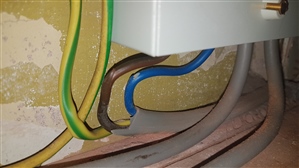Owain:
Currently anyone can call themselves an electrician, without the need for any qualifications or competency.
The Scottish Government is gathering information and views on whether regulations should be introduced in relation to electricians. While the focus of the consultation is on domestic work carried out for individual consumers, it will also apply to commercial and industrial work.
https://consult.gov.scot/energy-and-climate-change-directorate/a-consultation-on-the-regulation-of-electricians/
First, I am puzzled that the above post was moved from "Wiring and the Regulations BS 7621" to General Chat, which to me at least seems to have resulted in a down grade of the OP.
Secondly, I have often wondered, "Who examines the Examiners?"
A good friend of mine passed away a month or so back at 87 years of age. He was a Chartered Electrical Engineer, a title not awarded for some years now. His work included designing the electrical installations of large commercial buildings and sports.
Yet, once Part P was introduced January 1st 2005, just what electrical works could he do? Similarly me as an Incorporated Engineer? Both of us deemed to be unsuitable to carry out any electrical work other than perhaps fitting a plug (NOT a plug top!) to the Christmas Tree lights? And certainly not a a socket for it. (NOT a plug socket!)
To make matters worse, both my late friend and I both live in Wales, so here the Welsh Part P is as was originally published in 2005. Not the subsequent English Editions that have been published since, which at least would allow work to be signed off by a Scheme Electrician.
Anyway, it's cocktail time now. No point in going to the pub, as they cannot sell alcohol after 6:00pm, so will go and get myself a a Drakeford Cocktail...
https://www.leaderlive.co.uk/news/18917715.drakeford-mocktail-described-welsh-wet-uninspiring/
[/rantmodeoff]
Clive

We're about to take you to the IET registration website. Don't worry though, you'll be sent straight back to the community after completing the registration.
Continue to the IET registration site